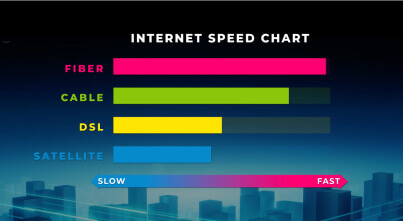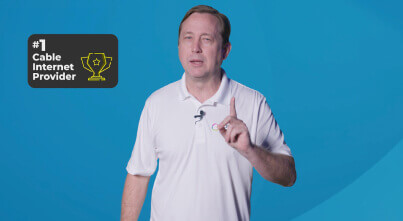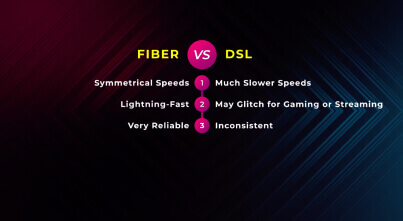Our Staff Reviews
Check out our reviews for other providers
Quantum Fiber
Quantum Fiber brings superior internet speeds and reliability at an appealing price
See moreVerizon
Verizon Fios delivers lightning-fast speeds and competitive, straightforward pricing
See moreAstound Broadband
Astound Broadband brings high speeds at low promotional prices, but watch out for price hikes
See moreConsolidated Communications
Consolidated Communications offers DSL and some fiber in select areas
See moreGoNetSpeed
GoNetSpeed brings a strong, fast fiber alternative to the Northeast, Missouri, Alabama
See moreT-Mobile
T-Mobile offers fiber internet and 5G home internet with unique 15-day “test drive”
See moreHughesnet
Hughesnet delivers solid satellite internet, but performance lags behind the competition
See moreWhat is Cable Internet?
Cable internet is very popular across the United States. Because cable internet works through the same copper cables as cable TV, 85% of American households can get a cable internet connection.
That’s good news, because cable is the second-fastest type of internet on the market, after fiber internet. Right now, major cable providers can give you download speeds up to a gigabit (1000 Mbps).
Upload speeds for cable are not nearly as fast. With most cable connections, you won’t get over 50 Mbps upload speed.
Still, good cable upload speed is satisfactory for most people, because it can handle online gaming, videoconferencing, and remote work. And most cable internet plans have either no data caps or very generous data caps, which means you can use plenty of data every month.
Pros
Cons
What is Fiber Internet?
Fiber internet is the most advanced internet technology on the market.
If you’re lucky enough to have fiber available in your area, you will get gigabit speeds (1000 Mbps) and perhaps even multi-gigabit speeds. Some fiber internet providers are offering speeds up to 10 gigabits per second (Gbps) of even 50 Gigs!
But fiber internet has another distinctive feature even greater than its lightning-fast speeds. Fiber speeds are symmetrical. In other words, your upload speed is just as fast as your download speed.
That’s revolutionary. All other internet types have much slower upload speeds than download speeds. For example, a fast cable internet plan might have download speeds of 1000 Mbps, but upload speeds would only be 35-50 Mbps.
For anyone who loves online gaming or works at home with large file uploads, fiber is a major advantage. It means there are no limits to the speed and smoothness of your connection. Fiber also has no data caps, so once you have fiber, you can count on the highest bandwidth and unlimited data.
There’s only one major drawback to fiber-optic internet: not everybody can get it. A recent study showed that just over 50% of U.S. households can now choose fiber internet.
Pros
Cons
What is Satellite Internet?
Satellite internet is a lifesaver that connects many people across the world who would otherwise lack any internet access. Sometimes, it literally saves lives, when first responders or the military use it for vital communications during disasters.
Satellite internet covers over 99% of U.S. households. If you have a clear view of the southern sky, you can get a satellite connection.
With recent advances in satellite technology, people who live in very remote areas can now stay in touch with loved ones and take classes online. You can even run an international business from a mountain or an island.
The most recent benefit of satellite internet has come with the rise of telemedicine. Now, even people who have trouble with transportation can visit their doctor virtually with their home internet connection.
Pros
Cons
What is DSL Internet?
DSL internet is the oldest technology still in common use across America.
In the 1990s, DSL was the latest and greatest innovation in internet speed. It replaced dial-up internet, which was maddeningly slow.
But times change, and now most DSL is far slower than cable or fiber.
The very highest DSL speeds are about 100 Mbps download/10 Mbps upload. And that is unusual. The fact is that a large number of DSL customers have speeds under 25 Mbps download/3 Mbps upload. Technically, speeds below that line mean that you don’t have high-speed internet.
But DSL internet does have wider coverage than fiber, and in some areas, DSL will be your only wired internet choice. In that case, you will have to look at the relative speeds and pricing for DSL vs. satellite internet.
Pros
Cons
What is Fixed Wireless Internet?
Fixed wireless internet is often confused with mobile service because of the word “wireless.” But a fixed wireless network will give you a different experience than your cell phone’s mobile internet connection.
Fixed wireless is also known as 4G LTE or 5G.
The main difference between your cell phone’s internet access and a fixed wireless connection is that fixed wireless is home internet. Though your internet signal is broadcast from a tower, like a cell phone signal, it travels from one “fixed” point to another. So, for example, there could be a wireless tower three miles from your home. Your signal will travel from that fixed point to a fixed antenna-receiver at your home.
In this way, fixed wireless is much like satellite service, because it does not require any cables to reach you. It’s not too surprising, then, that fixed wireless is known for a similar set of pros and cons as satellite internet.
Pros
Cons
Comparing connection types: which is best for you?
The five major internet technologies offer many ways for you to connect to fast, reliable internet. Digital opportunity is crucial for jobs and education, so it’s a real positive that internet access is improving across the U.S.
Which provider and tech type you choose will depend on what is available in your area. You can find out easily what providers and plans are available in your area by entering your zip code here at CompareInternet.com
Here is a quick overview of what you should expect from each of the internet types.
| Internet type | Pros | Cons |
|---|---|---|
| Fiber | Blazing-fast speeds Lowest monthly prices | Limited availability More complex installation |
| Cable | Gigabit download speeds Widespread coverage | Slower upload speeds Higher prices than fiber |
| Satellite | 99% availability Survives natural disasters | Higher prices and data caps High latency connection |
| DSL | Wide availability More reliable than wireless | Slow to very slow speeds Weak for high-data tasks |
| Fixed Wireless | Lower latency than satellite Faster speeds on way with 5G | 4G LTE still has slow speeds Data caps |
Resources
Our site has lots of handy pages that give you key info about internet speed. See which of these quick overviews will help you get up to speed!
Internet Service Provider
To set up parental controls on your home network, you can use the parental control features available in your router’s settings. Access your router’s settings through a web browser, locate the parental control section. You will be able to block specific websites or set up time limits for internet access for certain devices.
To set up a static IP address for a device on your home network, access your router’s settings through a web browser. Locate the DHCP or LAN settings section and find the option for assigning static IP addresses. Enter the MAC address or select the device you want to assign a static IP to, and specify the desired IP address. Save the settings, and the device will use the assigned static IP address on your home network.
To cancel your home internet service, contact your internet service provider (ISP) and inform them of your intent to cancel. They will guide you through the cancellation process, which may involve returning any rented equipment and settling any outstanding balances. Be sure you know about any early termination fees if you are on a contract. Document any communication for reference.
A data cap is a limit set by your internet service provider (ISP) on the amount of data you can upload or download within a given billing cycle. If you exceed this limit, your ISP may charge you extra fees or throttle your internet speeds. Not every ISP requires data caps: many providers offer unlimited data..
The average internet speed for residential users can vary depending on your region. In general, speeds can range from a few megabits per second (Mbps) to hundreds of Mbps for download and upload speeds. Here at CompareInternet.com, we’ll show you specific internet plans available to you so you can determine the speeds available in your area.
Compare Internet stats and providers by state
(Select your state to find your best Internet options)





















